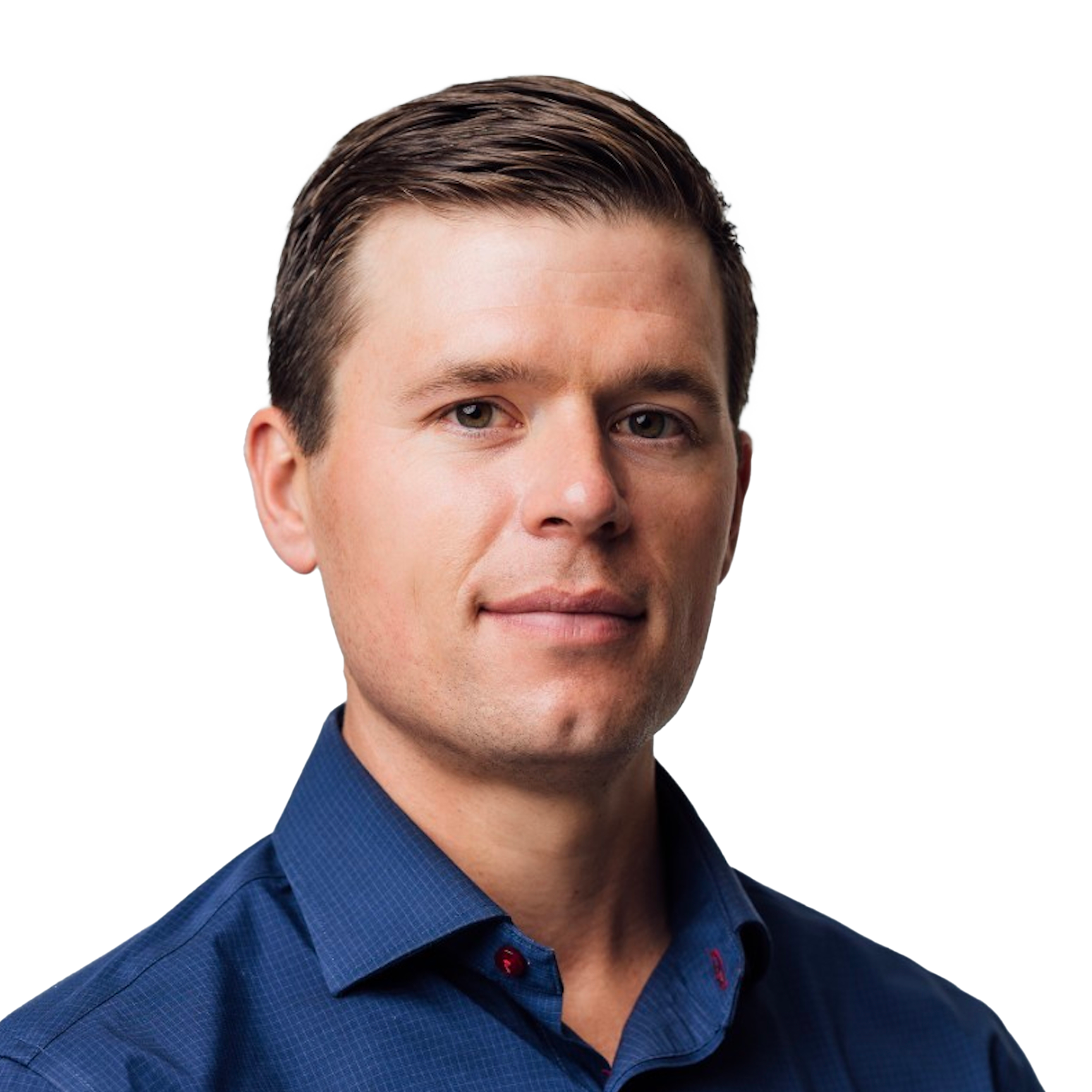
BACK TO PODCASTS
Anastasiia Binns
Head of RevOps
|
Semble
Episode #
17
Tracy Young sits down with Anastasiia Binns, Head of Revenue Operations at Semble, a patient management system for private healthcare providers in the UK. They discuss Anastasiia’s unique journey from a background in social anthropology to becoming a leader in Revenue Operations (RevOps). The conversation covers critical topics like balancing operational efficiency with empathy, transitioning roles within a company, and building RevOps functions from scratch.

Tracy Young sits down with Anastasiia Binns, Head of Revenue Operations at Semble, a patient management system for private healthcare providers in the UK. They discuss Anastasiia’s unique journey from a background in social anthropology to becoming a leader in Revenue Operations (RevOps). The conversation covers critical topics like balancing operational efficiency with empathy, transitioning roles within a company, and building RevOps functions from scratch.
Key Highlights:
Anastasiia’s Unique Path:
Anastasiia shares how her degree in social anthropology shaped her open-minded approach in RevOps, especially regarding cultural relativism and understanding how different departments or companies operate within their own context.
RevOps Foundations:
Anastasiia outlines her process for establishing RevOps functions, focusing on three key pillars:
- Operational Efficiency: Ensuring processes, tools, and KPIs are well-organized.
- Disaster Readiness: Preparing for worst-case scenarios and ensuring continuity.
- Strategic Growth: Making incremental improvements after laying the groundwork.
Challenges in RevOps:
Anastasiia discusses one of her toughest projects: managing 12 different CRM systems within a large organization, which she streamlined by implementing a simple, yet effective SharePoint system.
Tech Bloat and Lean RevOps:
The discussion dives into tech bloat, how startups can quickly accumulate unnecessary tools, and Anastasiia’s advice to approach tech purchasing as if it’s coming out of your own wallet. She also talks about keeping RevOps simple and lean by focusing on MVP solutions before adding complexity.
Advice for Aspiring Leaders:
Anastasiia emphasizes the importance of standing up for what you believe is right in the workplace, even if it means challenging the status quo. She also offers practical advice for handling crises, such as staying calm under pressure and leading by example.
Podcast Transcript
Tracy Young: Hi, welcome to Path to Growth. I'm Tracy Young, co founder and CEO of TigerEye. Today we are joined by Anastasia Binns, head of RevOps at Semble. Anastasia, welcome.
Anastasiia Binns: Hi, thanks so much for having me.
Tracy Young: Can you give the commercial for Semble? do?
Anastasiia Binns: Commercial for Semble. So Semble is a patient management system for private healthcare providers in the UK.
We have a relatively small market for private healthcare in the UK, but it is plagued by some of the same problems as Semble. All of the B2B SaaS seems to be having, so the disjointed system and the inefficiencies assemble comes into that space to help them do their jobs better and focus more of their time on their patients.
So it's been very close to my heart, this job.
Tracy Young: Yeah, it makes a lot of sense that would be the solution. You have a very interesting background for your career in RevOps. You have a background in social anthropology. So let's start there. How did your background influence your approach to RevOps?
Anastasiia Binns: It's a really fun question that my parents ask me all the time, and to be honest I don't think they can wrap their head around how I ended up in Rev Ops, but the main thing that social anthropology teaches you is that appreciation for Other ways of thinking. So one of the, one of the big things I've taken away from myself is this idea of cultural relativism.
So it's a concept that things are not wrong. You're just not in the context that thing exists in, right? So it looks at cultural practices and it goes, okay, so it may seem wrong and weird and alien to us, but for those people interested in their particular context, it is completely right. You might see where I'm going with this.
So when I'm talking to departments or companies who are doing. Completely wild things that seem wild to me or seem wild from the outside. I always get myself back to that frame of thinking of actually it might be right and it might be correct in the context of that particular company. You never know.
So yeah, it's the idea of keeping an open mind about the things that you're seeing in there and the places that you're working.
Tracy Young: That's fascinating. We get the luxury to talk to so many RevOps leaders over the years and I love that perspective and I can see why it's valuable in business, the ability to be open minded and have a bigger, wider perspective and also like a degree of patience because things always seem wrong.
Things always seem Very there's lots of tension and there's pressure and it's nice to be able to step back and try to look at it for what it is.
Anastasiia Binns: It's also, it's really interesting cause like I've done a bit, a lot of free lunch work in my past and a lot of the conversations Start with, we're doing this and we think it's completely wrong.
And you start digging into why people think that they're doing something wrong. And it's just because they've seen other people do something completely different. I've had people ask me like, Oh we report on these metrics, but we don't care about other metrics. But I've seen on LinkedIn that other people are doing this.
And, there's a little bit of SOMA. So it's always been nice to explain to people that it's not wrong because in the context of your business, what you're doing makes a lot of sense. So why don't you just keep doing it and forget about what everyone else says? So yeah, it's been quite nice.
Tracy Young: A lot of our listeners are on the go to market team and especially in sales. And I do believe your background at some point you were in sales or sales recruiting and you made the transition over into an operations role and revenue operations. Can you talk about, maybe the pros and cons and maybe if you faced any challenges during that transition or, what's attractive about it.
If you can walk us through that journey, that'd be great.
Anastasiia Binns: Honestly, I didn't have challenges switching over. So my story is that I was working for a small recruitment tech startup. And when I say sales, that role was account management. It was retention. It was sales. It was customer support. It was classic, like startup vibes where you just come in and you mock in.
The reason I switched over to operations is because that startup started going through big gross pains. And I've noticed that we were doing the same things over and over again, and not been expecting a different result. And we weren't really using our data in any way at all. Like we were missing some really key pieces of information.
So I approached my boss and I said, look, I'm the. Please, can you make a role for me here in operations or something similar or data, or I might just need to go somewhere else and look for this job somewhere else. So it was quite upfront, quite ultimately looking back at it, but yeah, luckily they gave me the job.
I'm surprised they did. Cause I had no experience. Like I said, the only thing I've been doing was sales up to that point, but In terms of the transition itself, it wasn't painful for me because I was transitioning same organization. I already knew that the ins and outs of the job and of the teams that I was supporting.
So if there's one piece of advice to others that are thinking about the transition of staying in the same company and create the job for yourself in the environment that you already know, because if you're trying to move over to different companies, do a new job, it's going to be so difficult.
First of all, to prove yourself to your new bosses, but secondly, to prove it. To you personally that you can do it. So it really knocks people's confidence if they do everything at the same time. Yeah, I can't really complain about my own transition though. I think as smooth as possible. And I think a lot of it was just the delusion and the kind of confidence of young age.
Tracy Young: And you asked for that job because you knew you could do well at it. You had all this tribal knowledge from being an account manager in sales and, renewals and customer relationships. And you also have this scientific mindset of, I can probably look at the data and help this be a more efficient, productive org.
That makes a lot of sense to me. So you've gone into many companies and actually have built up RevOps from the ground up at those companies. Can you share your process for, going in, evaluating the problems, maybe setting up a RevOps function from scratch? What's the first steps you're taking?
What are the things you're looking for to see what the initiatives are?
Anastasiia Binns: I tend to work along set pillars of things that I look at and I tend to look at things in three buckets. So the first bucket that I look at is like operational efficiency and disaster readiness. So in that bucket, we have. The processes that are already in place, what's missing, what's not good enough, those kinds of things.
Then we have the availability and usefulness of tooling. And then things like, do we understand what KPIs we're tracking and why, do you know, like the basic day to day things about the business and then the disaster readiness of it all comes in the form of. Okay. What happens if everyone gets hit by a bus tomorrow?
Like what happens to the business? So it's about looking at whether we have an org chart that makes sense of whether we have the lines of succession that makes sense. So again, really back to basics. Once that's been done, we can start having a look at kind of the data side of it all. So where are the specific inefficiencies?
Where are those small things? What's the data availability like? First of all that's a big question in a lot of companies. And then once that's been sorted out, I start having a look at that 1 percent improvement. So what button can I press to make sales 1 percent better, for instance, and that's where the strategic rev ops of it all comes in, and I think a lot of the time people expect you to go into the role and start doing strategic stuff straight away.
Whereas my philosophy has always been much, just get the basics really right, and then we can move on to. To the exciting stuff, right to the interesting bits.
Tracy Young: I worked in construction for many years and you have to have a good foundation. Without it, you can keep building up. It's eventually going to not work.
What do you think that most small to medium sized companies get wrong in rev ops? Or have you seen patterns in just things that could be better in those size companies?
Anastasiia Binns: I think it gets a little bit too quick. I think that's the best way to summarize. So you come in into RevOps and they go, okay, we've got all these great projects and these are all the things that we want to do.
And your initial reaction is to execute on all of them and to keep executing. So to keep picking up these projects, to keep picking up the pace, whereas actually what you want to do is do one small incremental change, wait for it to bed in for a quarter. Review results and then see if more changes are needed.
So a lot of the smaller or small to medium companies that I've worked with have stacked their changes so that they can't actually track whether the changes had any impact, whether taking on a lot at the same time and not being able to. See, even if any of it has been successful. So what, there's a big thing in the sales and revenue world, right?
That speed is off the essence and we need to be quick and we need to outpace the competition. But from my experience with on the other side of the fence, like with enterprise companies is that they actually go really slow and steady and they take their time and they get to a place where a project is finished and then they take an even longer force to collect results from it.
So it's never that. hectic pace of a startup, but there's something to learn from that side of the pond as well, I think.
Tracy Young: It's all about measurement, and seeing the effectiveness of the calories you've spent.
Anastasiia Binns: Exactly.
Tracy Young: What was the most challenging project you've tackled in RevOps? Can you think of one that you could share?
Anastasiia Binns: So I always whip this one out. So I've worked in a company that had 12 different CRM systems. It's one of the biggest privately owned companies in the UK and they're a giant, absolutely giant in the industry. But because of the way they've grown by they acquired. Smaller companies and absorb them into the machine.
They never brought the systems part of it together. So each small company would operate as its own thing, but under their, the mothership brand. So yeah, we ended up with 12 different CRM systems, which was really fun. But the project was that effectively my sales leadership did not know how much.
The sales teams have billed within the month until the official finance reports came out. And there was also no way to query what finance are reporting because they had no record effectively of what was happening. So you couldn't go, okay, finance, you're wrong. And actually you've missed these numbers.
So we were massively under reporting. We had no visibility of anything. And the project was actually. Really like stupidly simple. It was literally to set up a sales book, like an orders book. And we did it in SharePoint. So we set up a SharePoint list with a form. So each salesperson would make a sale, they would fill in the form and they would put like the associated opportunity ID.
Into that, and then the ops team could then go and reconcile it. So they would go, okay. So they put through this this order. This was the opportunity to close one. Therefore it will be correctly appearing in finance figures. And we were able to find I think one month we found up to 200, 000 pounds that would have been underreported because something went wrong in this chain of salesperson closing opportunity and it being reported in finance.
Stupidly simple project, like all that involved was setting up one SharePoint list, one form, on the face of it, nothing complicated. But underneath all that, the cultural jump from salespeople not having to report daily on what they sold, to them having to actually share full transparency of what their run rate is on a daily basis.
The fact that we were able to then pull really comprehensive performance reports on everyone because we were able to see like when their peaks and troughs were in a month and all that kind of stuff. We were able to see how much of each product was being sold. When we knew who was really not pulling their weight in a particular product.
So whilst the technical side of it all was really. Stupid simple, the cultural side of it all and bringing people around it and explaining that this is not a bad thing. So to tell the management what you've sold, that was the difficult part of it.
Tracy Young: Yeah. Having been through an acquisition where my last startup was acquired and I got integrated into the mothership, except that the CRM systems and there's three other acquisitions at the time.
Mothership never integrated the systems, at least not when I was there, because it's just really hard to do. So I totally understand why it was just easier for this company to just let 12 different unique CRN systems be in place because it was just more, it was, that's painful, but it was more painful to integrate 12 systems together.
And of course, the obvious thing to do was to, Get them on something that is the same, whether it's a SharePoint list or anything, just so that reporting can be in one place. And that is really funny to me. I've never heard of anything like that. Not that many environments, but that makes sense.
If it's like an older public company, over time you just end up having a lot of systems. So let's switch over to tech bloat. I think, especially in operations, you were in marketing operations, sales operations, revenue operations. Just over time, if a company has any success at all, there's just going to be a lot of systems in place and There's usually a lack of courage to rip something out of someone's hands, especially if they like using it.
So then you just start tackling on more and more solutions, especially as new generations of leadership come and go over the years. What's your advice on tackling tech bloat and like the common mistakes with companies and how you would advise them to address that.
Anastasiia Binns: The best thing that got me through this was, I think, my background in these really small startups, because if you work in those small startups, you treat The company money is if it's your own.
And I think that's the best advice that I can give anyone in any kind of buying position. Just think of the company money as your own. Would you spend on it or would you actually first go and see if something you already have can fix the problem? Cause if it's coming out of your own wallet, you would go and check first, right?
Yeah, I think that's the best piece of advice that can give. And then the second best piece of advice is to not get on the hype trains. For as long as possible. So there's a lot of kind of product based hype on LinkedIn at the moment. And a lot of people are pushing their resolutions and showing them off as like the silver bullet to every single ailment within a company.
And I think if the longer you. observe it from the outside, the more you can see the cracks. And if you just stop yourself in that initial knee jerk reaction of everyone's doing it and I should as well, you'll save yourself so much pain down the line.
Tracy Young: And how do you evaluate what's worth keeping or maybe what's worth buying?
I'm sure you're just inundated by sales teams trying to sell you RevOps tools in such a
Anastasiia Binns: With the specialization I chose with HubSpot, I think if I was if I was more of a Salesforce professional, I'd probably have a lot less money. Let's just put it that way. I'd be spending a lot more, but with HubSpot, because of the way the product is developing and because of how much they have just out of the box, I've always been of the mindset of.
And this new tool came in and somebody is pitching me this new solution. I can do that now myself with a little bit of time investment. So why would I pay for something that I can build myself? So quite a personal thing as well. I think a lot of my colleagues will, Look at a third party provider and they will go that's saving me time and money.
And actually I'm not confident that I'll be able to do it myself. So that's a completely different scenario. But for me, I guess my personality as well, I've always just been a very tight with with the purse strings. So I've tried not to spend on anything at all, unless it's completely irrelevant.
Tracy Young: Really having the startup DNA of making sure you're spending the company's money like it was your own. And of course, if you can build it, why would you purchase it? You've written and spoken about lean rev ops. Can you tell us more about that?
Anastasiia Binns: Yeah. So going back to tech bloat, I guess that's one of the things, again, just making sure that you're spending the money as if it was your own.
The other thing as well, is that it's about keeping your own world as lean as possible. And I'll explain what I mean by that. So when you come into a RevOps role, immediately have a to do list as long as you're on. And it's about having that conversation and going, okay, cause I can deliver on this.
really quickly. This will take me a long time and this is just a never thing. So it's about having those kinds of conversations as well and making sure that you can keep your own world really tidy and really structured too. That's lean for me. And it translates to a lot of different things.
So projects. CRM implementations need process improvements. So you're always looking for the very best MVP solution, treating it like a product life cycle, right? So you find the MVP and then you make it more complex after you've delivered the MVP. Whereas a lot of a lot of rev ops approaches to just scope the whole thing and every single eventuality and build for every single thing.
Whereas for me, it's more about what's the absolute minimum that I can get away with. And then let's increase the complexity afterwards. So yeah, lean in different ways. I think not in literal sense of the words either, but just keeping that kind of approach of just keep it simple and keep it simple for as long as possible as well.
Tracy Young: Yeah. One of our core values is simplicity. So I totally understand that. And you're right. That most. Rev Ops projects that get pitched to me over the years, they are very visionary and robust, and I liked the product delivery mindset of just get the minimum viable product out there, get it in use and we'll like iterate.
Anastasiia Binns: Exactly.
Tracy Young: Let's switch gears a little bit. To leadership questions, trust in leaders can be made or broken when things get tough. And I'm sure you've been, even hearing you talk about, one of the first things you look for is what are we going to do in a disaster? So I know you're, a lot of those things like tough times are coming half the team might just walk out or get fired.
Do we have succession, but I guess, how do you deal with a crisis? When things go bad in a company and it's, all things are always seeming to go bad.
Anastasiia Binns: Do you know, it's really interesting that question for me, because there's the two parts of me, the human part of me deals with the crisis by freezing.
So that's my response is to freeze. The professional part of me deals with a crisis by just continuing to carry on. There's that great British keep calm and carry on kind of vibe. But I think. In between those two approaches that's the golden that's the Goldilocks approach to it. So you want to pause for long enough to assess what's actually happening and what the response should be instead of just trying to deliver something or, say something to make things better.
And then you want the, um, the measured. Slow, steady, collected response afterwards, because the reality is that in a leadership role, your team is panicking around you, you don't need to add to the panic by also being one of those really hectic voices. In fact, I found most really stressful situations, or most war room phone calls I've been on if you slow yourself down physically, if you slow yourself down to slow down what you're saying, the way you're delivering it, choose the correct words, the room calms down around you.
And I think it's that It's that kind of approach that I try to take now. Like obviously there's situations where I'm also hectic, but if I'm given the, if given the time to to prepare for it even slightly, or if I'm seeing that actually everyone around me is spinning out of control, then my approach is always to be like the calm voice in the room as much as possible.
Tracy Young: I love that. And I totally resonate with that. There's this term called, flight or fright. What is it?
Anastasiia Binns: Fight to flight. Yeah. Yeah.
Tracy Young: Yeah. And I've always heard that. And it's that doesn't apply to me. I neither want to flight. Neither do I want to fight. I also freeze and take in everything and then try to move forward.
Tell us about one person who has helped you become the leader you are.
Anastasiia Binns: I don't think it's one person, but I think it's a combination of all of the people that I've ever reported to. I've had an eclectic mix of bosses over my time, so it's been everyone from heads of sales operations, directors of sales operations, all the way through to company MDs and I think each one of them has taught me something slightly different.
One to point out the most, I think it was Rob Ruff, so he was my boss when I was at Iris. The reason I always think back to him is that he's probably taught me a lot more about navigating the human side of rebel ops than everyone else. So all of this kind of the slow calm and collected and the think about the people and how will the people react if if we roll out the process.
So really the human side of ops he's taught me all about that. Yeah, I think without that kind of influence. My approach to revenue operations would have been very different. It would have been a lot more like a lot more robotic in a sense. This is what the data is showing us and, just get over it, get on with it.
But yeah it's been interesting with him cause he's he was very people centric as well as himself. And it's showed me how to navigate a lot of these conversations.
Tracy Young: I can tell how much you've admired his empathy and constant thinking about the team and the customers. Cause at the end of the day that's what business is.
We're here to serve people. What other traits? It's funny. I've also feel like there hasn't been one leader I've worked for that has super inspired me, but I've taken something from all of them, whether it's good or bad stuff that I would never do or stuff that I'd love to emulate. So let's talk about Maybe some traits that you've seen from your managers that you would never want to replicate.
Anastasiia Binns: Hey, have you got another hour? It must be here a while. Yeah, I think just let's go back to this idea of executing too fast and being too hectic. So I've worked with and for a fair few people who have just wanted to move. They just wanted to change all the time, change approaches, change the ACP, change process, like if something wasn't working, their knee jerk reaction was to change it straight away.
Instead of actually letting it run maybe for another, at least another five minutes to see if we can collect more data. So it's that kind of stuff that, that you come across. The most I think in revenue operations, I'm sure like a lot of my colleagues will resonate with this as well. That's the most difficult thing, the most difficult trait that you can come up against in rev ops.
So yeah, the hectic minds is something that I've tried not to absorb from people, but also again, if we think back to the people side of it all, I think a lot of CEOs will go down the, that robotic route of, something's not working, Let's just change the process. It's just numbers.
It's just ones and zeros, right? And it's all black and white. Whereas when you do take the time and you do consider the human element of it all, you realize there is a lot more richer, a lot more contextual stuff that's happening. And. That's what I try to deliver in a lot of my stuff. So I do, I always try to deliver the data, but then also the human element alongside it to show that the data is not the be all and end all.
There's also the lived experiences of people that we need to consider. But yeah, it's the hecticness for me. That's the one thing I can't deal with. Yeah. It's unnecessary. I think so. And I think it comes from panic as well a lot of the time. And from the FOMO overall.
Tracy Young: I understand that. I think as a founder, when things aren't working, you just want to react to it.
So it's nice hearing your perspective about it. It's something I'll definitely keep from, fall away from my own personal journey. What advice would you give Anastasia 10 years ago?
Anastasiia Binns: Don't take things so seriously. The thing as any young professional, really, there was a time in my career when I thought I was saving lives with my little spreadsheets and a lot of it was the product of the environment I was in.
So I was in an environment where it was absolutely not okay to make a mistake. It was like a big scandal every time something went wrong. That kind of created the idea in my head that my job was super serious, that, we're saving lives here. Everything has to be pristine and perfect. When in reality, when you step away just like a little bit from it all, you realize that it's not, it's really not that serious.
So I think that's a piece of advice to give myself back in a day, just, Chill out. It's not that, it's not that important. It's not important enough to lose sleep over.
Tracy Young: Is this a funny thing about perceived failure when things go bad is it seems so dramatic and bad in that moment and then enough time passes by and you survive it and you overcome that obstacle and you just move on from it and it's no longer a problem and you realize how trivial it was in the first place.
It's not like stage four cancer, your kid has leukemia or something that is, really bad and irreversible. Most things in business you can overcome. There's always these cycles in the case, like you might feel really bad, but it's going to feel good again. And then, it feels good for a long time and then some bad things gonna happen.
It's just a cycle of good and bad.
Anastasiia Binns: The other thing as well is the embarrassment of it all, right? If you're a young person in a job and you've done something wrong, you do feel embarrassed. But one thing that's really helped with that is just thinking can you think of something embarrassing that somebody's done that was exactly.
If we can't remember it about somebody else, people don't remember it about us. And yeah, again, going back to the fact that it's not that deep. Nobody will remember it in a couple of months time and just, it'll be okay.
Tracy Young: It's actually the best advice I've gotten in public speaking.
I used to get so nervous on stage. And then a friend who is classically trained as an opera singer, she just told me like, no one's thinking about you. Yeah, exactly. When have you remembered someone bombing on stage? I'm sure it's happened, but you don't remember them. Like name one person. I was like, I don't remember.
I'm sure I've been to bad talks, but I just don't care. And she's yeah, cause no one is thinking about you except for yourself. So get over it. And that was the most horrible thing anyone's ever told me, but it can definitely be applied to, outside of public speaking. All right. Last parting advice for our listeners.
There was the advice for Anastasia to not take things so seriously. What's like just general advice for, professionals coming up in their journeys and they're very ambitious. They want to, lead departments and they're just on their way there.
Anastasiia Binns: So don't compromise what you think is right.
because of the company that you're in. So I get to speak to a lot of young professionals just by the nature of me being open on LinkedIn to people reaching out to me and through the mentorship that I do, a lot of young professionals come to me and they go I know that this is the right thing to do, but my company absolutely doesn't see it that way.
And I always say, Pressure point, if this is something that you feel passionate about and you feel like this is the right way and they're about to mess everything up, make your point, make yourself heard. And a lot of us go through our whole professional careers being constantly met with a wall of.
knows and we just don't tend to fight for what we believe in or what we feel is right. And it amalgamates over the years into that level of bitterness and resentment towards your job, that you just stop enjoying it and you stop trying. So if we start off by saying, Actually, I really believe in this idea and I am going to press the point and I am going to be annoying about it because I really think it's right.
Then we set ourselves up for a career where we can just constantly advocate for ourselves. I think that's so important. So go be annoying, go annoy people with your ideas because that's, That's how you get the job satisfaction, right? As well.
Tracy Young: Yeah, we all want to work at a place where we feel like we're contributing and making a difference.
Even if we're not saving the world, right? We're just trying to fix this one small process at a time. I think that is excellent advice. I think it's also important for all of us to remember that we can question status quo without being disrespectful. Of course, we never want to be. It can be a little bit annoying, bringing up issues, but there's a difference between being irreverent and being disrespectful.
And we want to hear on the other side. Anastasia, it's been such a nice conversation with you. I think there's lots of tidbits that our listeners are going to take away. So thank you so much for joining us today.
Anastasiia Binns: No worries. I've enjoyed it. Thanks very much.

.png)













